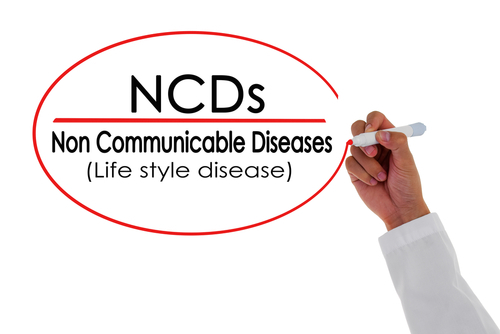What is the WHO's newly launched Progress Monitor about?
M3 India Newsdesk Oct 03, 2017
The WHO has released a new report, exhorting governments to increase their efforts aimed at reducing premature deaths from noncommunicable diseases.

The WHO has strongly emphasized that current government efforts are not enough to meet globally agreed targets.According to the report, the efforts are particularly proving to be insufficient in preventing some areas such as cancer, diabetes, and chronic respiratory and cardiovascular illnesses. Together, these diseases are the world’s largest killers, killing around 15 million people around the world every year, all between the productive ages of 30 to 70 years.However, despite such grim statistics, nations across the world have not shown adequate and similar levels of commitment, The WHO Non-communicable disease Progress Monitor 2017 monitors the targets, policies and action plans to tackle the four main risk factors for these NCDs, namely: tobacco, unhealthy diet, physical inactivity and harmful use of alcohol.
The Monitor also tracks capacities to treat these NCDs. The Monitor however, shows that there has been imbalanced progress across nations in terms of building these capacities and even in terms of developing strategies to mitigate the risk factors. In most cases, the action taken has been insufficient and incomplete to meet the demand of the problems.Dr Tedros Adhanom Ghebreyesus, WHO Director-General noted that there had been advances in the fight against NCDs but also said that nations needed to work much harder to fight a problem as large and complicated as NCDs. He said, "Bolder political action is needed to address constraints in controlling NCDs, including the mobilization of domestic and external resources and safeguarding communities from interference by powerful economic operators."
The Monitor collects a wide variety of data, utilizing a total of 19 indicators and data is collected across all the member states of the WHO. An important part of these indicators is setting time-bound targets to reduce NCD deaths, building and developing comprehensive policies to tackle the problem of NCDs. Other important steps include implementing steps to reduce the demand of tobacco, a major contributor to NCDs, reducing the impact of harmful alcohol consumption among citizens in the member states, and promoting physical activity among citizens. Most importantly, the Monitor includes indicators which measure the strengthening of health systems through primary health care and universal health coverage.
Some key highlights of the 2017 edition are:
- Nearly 93 countries have set national targets to address NCDs, up from 59 in 2015, which is a significant growth in a matter of two years.
- A total of 94 countries have implemented operational multisectoral strategies to address NCDs, compared to 64 in 2015.
- A total of 90 countries have developed guidelines for managing the four major NCDs, up from 50 in 2015.
- A total of 100 countries have conducted physical activity awareness campaigns.
- Six countries have not achieved any of the progress indicators, compared to 14 in 2015. Five of the six countries are from Africa.
- Costa Rica and Iran lead the 10 the best performing countries, with each achieving 15 of the 19 indicators, followed by Brazil, Bulgaria, Turkey and the United Kingdom (each 13); Finland, Norway, Saudi Arabia and Thailand (12).
- No country from the WHO Africa region achieved more than eight of the progress indicators.
Dr Douglas Bettcher, WHO director for the prevention of NCDs, noted that the world is severely lacking the efforts and discipline required to meet the set targets. The WHO member states have set a target of reducing premature deaths due to NCDs by a third by 2030, however the world is not on track to meet the target set by the Sustainable Development Goals.
"We need to urgently accelerate progress in the battle to beat NCDs," added Dr Bettcher. "The window of opportunity to save lives is closing. This is playing out before our eyes in many ways, including in the increasing numbers of people, particularly children and adolescents, suffering from obesity, overweight and diabetes. If we don't take action now to protect people from NCDs, we will condemn today’s and tomorrow’s youth to lives of ill-health and reduced economic opportunities."
The Progress Monitor’s findings will be the main agenda of discussion of a WHO report being submitted to the United Nations Secretary General later this year, and the topic of NCDs will be a major topic being tackled by the UN next year, which plans to hold the third UN High-level Meeting on NCDs in 2018.At the January 2015 Executive Board meeting, Member States requested the WHO to produce the WHO Non-communicable Diseases Progress Monitor. A few months later, the organization came out with a technical note which listed the indicators to be used in the report. The World Health Assembly noted in 2016 that the Progress Monitor will be used to present a report to the UN General Assembly in late 2017, which will include details on efforts taken by countries to develop national responses addressing the four major NCDs.
The WHO report also documents efforts by countries to implement cost effective interventions which will provide maximum benefits to prevent or delay most premature NCD deaths, these interventions were endorsed during this year’s World Health Assembly.These readily implementable measures include hiking taxes on tobacco products, packaging them in plain packages, reducing the sodium content in food, providing drug therapy and counselling to people with diabetes and hypertension, and screening and vaccinating girls and women to protect them from cervical cancer.
-
Exclusive Write-ups & Webinars by KOLs
-
Daily Quiz by specialty
-
Paid Market Research Surveys
-
Case discussions, News & Journals' summaries